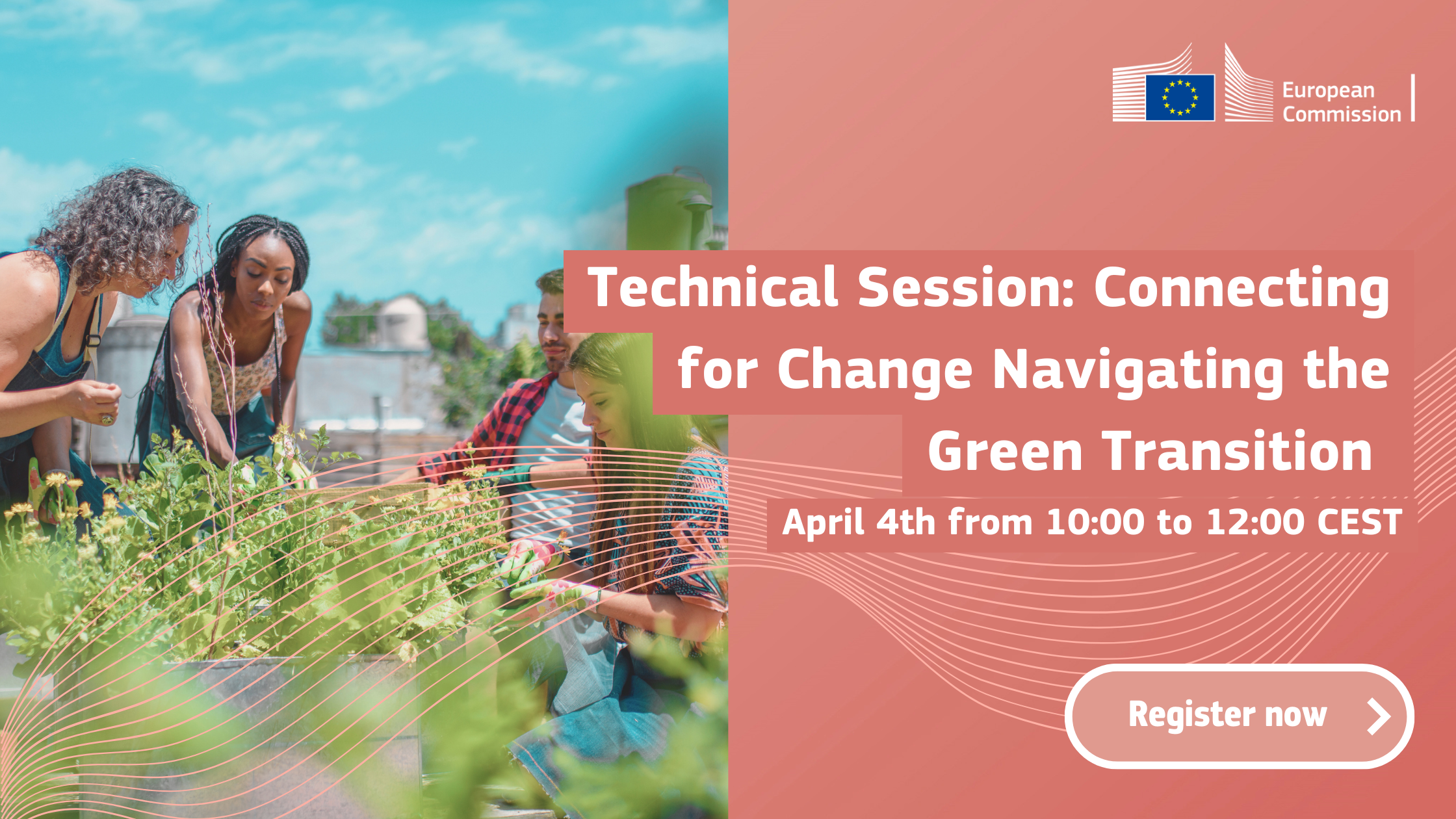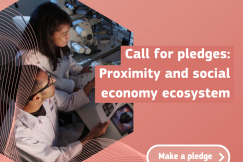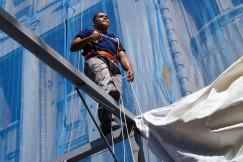Articles
13 May 2025
First Technical Session - ‘Connecting for Change: Navigating the Green Transition’
Articles
13 May 2025
Regenerative Green Transition
Proximity and social economy
Agri-food
+33 more
Login / create an account to be able to react
-
7

On 4 April 2025, the first technical session of the EU Proximity and Social Economy Platform took place online under the title ‘Connecting for Change: Navigating the Green Transition’. The event focused on regenerative green transition strategies, spotlighting practices in circular economy, green skills, food systems, energy communities, and collaborative governance. It featured inspiring pledges, contributions from Platform Ambassadors, and interactive breakout sessions designed to foster cross-sectoral synergies, encourage pledge participation, and strengthen collaboration across the proximity and social economy ecosystem.
Topics
EU-27
Academic / Research and VET Institutions
Business Support Organisation
Company with 250 or more employees
Cluster Organisations
Consumer Organisations
Cultural and Heritage Organisations
Destination Management & Marketing Organisations
EU Institutions
Financial Institutions and Investors
Industry Associations and Chambers of Commerce
International Organisations
Local Authorities
Media / Journalist Organisations
National authorities
Networks and Federations / Confederations
NGOs / Non-profits
Notified Bodies
Regional Authorities
SMEs (a company with less than 250 employees)
Social Economy Entity
Trade Unions
Other
-
Thematic area
-
-
Regenerative Green Transition
-
-
Interlinkages with other sectors
-
-
Proximity and social economy
-
Agri-food
-
Energy intensive industries
-
Energy-renewables
-
-
Action areas and keywords
-
-
Access to technology
-
Buy social
-
Circular Economy
-
Clusters (including Cluster of social and ecological innovation)
-
Data Maturity and data driven business models
-
Data sharing, Data management & Code of Conduct
-
Digital Platforms
-
Digital social innovation
-
Future workplaces
-
Greening infrastructures and business operations
-
Innovation
-
Innovation as enabler for green transition and business development in the social economy
-
Internationalisation
-
Local employment
-
Local Green Deals, green business communities and citizens’ initiatives
-
Local Markets
-
New business models
-
New business models – the platform economy
-
Public and private tech partnerships and support
-
Reinforcing Business to Business collaboration for greener and circular value chains
-
Responsible (Public) Procurement
-
Socially oriented territorial regeneration
-
Strategy for Data
-
Supporting Digital Social Innovation & Tech for Good entrepreneurship
-
Tech for Good
-
-
Ecosystem focus
-
-
Proximity economy
-
Social economy
-
-
Scope of activity
-
-
International
-
Local/neighbourhood
-
National
-
Regional
-
Share
On 4 April 2025, the proximity and social economy (PSE) ecosystem gathered online for the first technical session of the project ‘Transition Pathway Stakeholder Support Platform: Implementation for the Proximity and Social Economy Ecosystem’. Titled ‘Connecting for Change: Navigating the Green Transition’, this event marked the beginning of a thematic series aimed at strengthening collaboration, sharing knowledge, and building momentum around the green and digital transitions.
The session focused on regenerative strategies that go beyond reducing emissions to actively restoring and optimising resource use, thereby fostering a resilient and inclusive green economy. Rooted in local communities and informed by lived realities, regenerative practices are central to ensuring a just transition. The event reflected the PSE Platform’s commitment to catalysing these transformations through concrete action, cross-sectoral dialogue, and stakeholder empowerment.
Alberto Licciardello from the European Commission (DG GROW) opened the session by welcoming participants and reaffirming the platform’s mission. He noted that over 230 pledges have already been collected, available both on the Stakeholders Platform and via the Europa portal. He encouraged participants to draw inspiration from these pioneering examples and reminded them of the upcoming pledge submission cut-off on 25 June.
The event, moderated by EURICSE and Diesis Network, pursued four objectives: to promote the PSE Platform; showcase outstanding practices through the INSPIRE panel; highlight Ambassadors’ contributions to the Transition Pathways; and strengthen links with other ecosystems, fostering cross-cutting synergies.
INSPIRE Panel Session: Regeneration in Action
The INSPIRE session spotlighted four pioneering initiatives demonstrating how regenerative approaches can address environmental challenges while advancing inclusion and local development:
- The Rediscovery Centre (Ireland)
Roger Warburton presented Ireland’s National Centre for the Circular Economy, a repurposed boiler house turned educational hub. It exemplifies circular design in infrastructure, supports local social enterprises, and acts as a catalyst for green innovation. - Data Food Consortium (France)
Rachel Arnould explained how the consortium builds open-source, interoperable standards to connect fragmented local food networks. By enabling digital integration, the project contributes to both green and digital transitions while promoting transparency and cooperation. - Ecooo (Spain)
Marina Vargas Ruiz shared how Ecooo empowers communities through democratically governed renewable energy projects. These citizen-led models offer a compelling alternative to investor-driven systems, ensuring deeper local engagement and energy resilience. - Coompanion Gothenburg (Sweden)
Diana Ghinea detailed Gothenburg’s collaborative governance model featuring a Transition Council and Citizens’ Assembly. While promising, the model also reveals ongoing challenges: scattered efforts, unclear roles, and the need for genuine, non-tokenistic participation.
CONNECT Breakout Sessions: Deep Dives into Practice
Three breakout rooms led by platform Ambassadors invited participants to connect regenerative ideas with on-the-ground implementation across food systems, energy, and urban governance.
- Breakout Session 1: Resilient Food Systems
Led by Nick Weir (Open Food Network Europe) and Rachel Arnould, this session emphasised stakeholder mapping, the role of municipalities, and practical levers like community hubs and digital infrastructures. Challenges included policy inconsistency and limited rural connectivity. - Breakout Session 2: Local Energy Communities
Giorgio Nanni (Legacoop) and Marina Vargas Ruiz explored the transformative potential of local energy communities. Centred on trust and place-based design, these communities empower citizens while advancing EU decentralisation goals. A recurring challenge remains youth engagement and strategic communication. - Breakout Session 3: Collaborative Cities and Governance
Erdmuthe Klaer-Morselli (REVES) and Diana Ghinea examined how cities can embed the social economy in transition strategies. Examples from France and the Netherlands illustrated promise, but speakers warned of persistent greenwashing and the need for genuine departmental coordination.
Concluding Reflections: A Call to Co-create
The session closed with a strong call to action: to bridge policy and practice through ongoing participation, strategic partnerships, and knowledge sharing. Regenerative green transitions demand more than innovation. They require co-ownership, trust, and inclusive governance across all sectors. The Proximity and Social Economy Platform remains a vital tool for enabling these transformations. Through ongoing events, the platform provides a dynamic space for learning, dialogue, and pledge-making—essential ingredients for building a future where local economies regenerate both people and planet.
Building on this momentum, the conversation continues with the next technical session on 19 May 2025, titled ‘Connecting for Change: Transformative Digital Transition’. This upcoming event will explore how digital innovation can empower the social economy to drive systemic change and deepen its impact across communities.
Comments (0)
See also
-
3
Content Highlights: Regenerative Green Transition April and May 2025
- Categories
- Proximity and social economy Agri-food Construction +62 more
-
36
Progress report of the proximity and social economy Transition Pathway: Key insights
- Categories
- Regenerative Green Transition Skills Transformative Digital Transition +59 more
-
4
Working Conditions and Governance Highlights April and May 2025
- Categories
- Proximity and social economy Agri-food Construction +62 more




